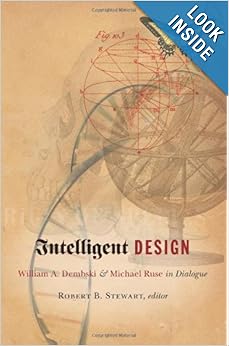 Recently, our philosopher photographer friend Laszlo Bencze wrote on why theistic evolution is incoherent, attracting some considerable interest and discussion. He has written to say that he would like to follow up with a shoutout to William Lane Craig, and here it is.
Recently, our philosopher photographer friend Laszlo Bencze wrote on why theistic evolution is incoherent, attracting some considerable interest and discussion. He has written to say that he would like to follow up with a shoutout to William Lane Craig, and here it is.
Editor’s note: The topic got started with “Is apologist William Lane Craig a follower of Darwin?” (And if not, wherein does he differ from him in a coherent way)?
The theologian William Lane Craig, writing in the book Intelligent Design: William A. Dembski & Michael Ruse in Dialogue, has this to say in defense of theistic evolution:
[The evolutionist] may agree that there are in nature no fundamental telic [goal-oriented] causes, while maintaining that nature itself is constructed with the end in view of the evolution and existence of intelligent life. The view commonly known as theistic evolution would be a religious version of this perspective. (page 62)
A designer with knowledge of such counterfactuals could choose to arrange the appropriate boundary conditions and constellation of natural laws that God knew would lead, via a blind evolutionary process, to intelligent life. For these reasons we cannot treat dismissively the theistic evolutionary perspective. (page 63)
The perspective Craig argues for is what I characterize as the Bowling with God point of view. If God were to bowl a game with you he might make the game more fair by agreeing not to monkey with the ball or pins while they were in motion. He might agree to launch the ball just as you would and remain absolutely “hands off” after that. But because he is God and has perfect knowledge of the lane, ball, pins, and all subtle environmental factors, every time he let go of the bowling ball, he would know its absolute trajectory and precisely how each pin would respond and thus be able to create a strike or (more impressively) any spare he chose. He would be in perfect control of his game even though all the random factors played out without interference from him.
Could this be considered a fair game? Of course not! You’re playing against God! The score of the game frame by frame is exactly what God wants it to be. You’ve been set up. The situation is the same in Craig’s theistic evolution scenario. If God fools around with initial conditions such that they will result in the outcome he desires, it makes no difference that he agrees not to interfere as the process plays out. The deck is stacked. God is in control. This is not evolution as Darwin or any of his current acolytes see it. It is simply an astoundingly subtle form of creation. Call it “Initial Conditions Creation” not theistic evolution.
It’s not surprising that Craig and countless others would want to hitch a ride on evolution. The word carries immense metaphysical power as no other science word does. It is for this reason that I think it is important to come to grips with it even though it is often used in ways so ambiguous and contradictory as to defy definition. Because of its power, it is a word which religious people of all stripes including deists, theists, crystal power enthusiasts, Catholics, Protestants, communicators with the dead, agnostics, and atheists all seek to co-opt and use to promote their own particular agendas.
Earlier this year a professor of theology at Wheaton College vehemently objected to my saying that the term theistic evolution was a flat out contradiction. He mocked me as a mind reader because none of the many self-described theistic evolutionists he knew at Wheaton happened to see any contradiction. Because several respondents to my previous post argue along the same lines, I shall try to present my case as clearly as possible.

First of all, the bare term “evolution” is a protean term. It is used to mean anything from “change over time” to “the way God creates” to “a purely materialistic process based on random mistakes chosen by natural selection.” No wonder the term can be so hugely confusing and the source of vehement argument. However, there is only one usage of evolution that wields immense metaphysical power. It is the version which says speciation proceeds by a process undirected by any conscious agent (no God), operating via the spontaneous appearance of mistakes (random mutations), and filtered by natural selection (elimination of the unfit). This is the standard Darwinian or neo-Darwinian usage, which is how current biologists understand and use the term.
===============================================
Of course Darwin objected to such theistic misunderstandings. As he so often and so patiently explained, his theory needed no help from any god or spirit and if a god had to be injected into it to make it work, it would be a worthless theory.
===============================================
This purely materialistic version is the one which revolutionized the foundations of Western thought when it first appeared in Darwin’s On the Origin of Species. Even though Darwin did not use the word in early editions of Origin (it first appeared in the writings of Herbert Spencer), by the 1870s “evolution” was the accepted way of referring to his theory. Almost immediately after the 1859 publication of Origin, people began explaining evolution as a guided process. Often it was God doing the guiding, sometimes a “vital spirit” or “life force.”
Of course Darwin objected to such theistic misunderstandings. As he so often and so patiently explained, his theory needed no help from any god or spirit and if a god had to be injected into it to make it work, it would be a worthless theory. The whole point of his book was to present an overwhelming case for why evolution worked automatically, without guidance from any conscious entity. Eventually the guided versions of evolution were swept away and by the 1940s only the pure Darwinian version was taken seriously in scientific circles.
It’s easy to see why Darwin’s theory of evolution was so revolutionary. Before Darwin, clerics, biologists, and laymen all agreed that nothing so complex as a living thing could be produced without the efforts of a conscious agent, generally agreed upon as God. After Darwin just about every intellectual, including clerics, agreed that generation of new species could happen on its own without the efforts of God. In fact, as more and more people fell under Darwin’s influence it became clear to them that not only was God unnecessary in creating life but that God was entirely unnecessary, nothing more than a human concept that had run its course. In this way the impulse towards methodological naturalism received a huge boost from Darwin, a boost which has accelerated steadily right into the present.
===============================================
No longer did serious thinkers have to put on the hair shirt of humility and kneel in awe before the works of a Mind far greater than theirs. Now they themselves were gods standing high above creation armed with the long sought key to understanding—evolution.
===============================================
“Evolution” became a word with which to slay any lingering remnants of a religious tradition in science. Evolution could even explain human behavior, ethics, the origins of war, and the intricate dance of relationship between man and woman all without any reference to a creator. It was so fresh, so enlightening, so wonderfully scientific! No longer did serious thinkers have to put on the hair shirt of humility and kneel in awe before the works of a Mind far greater than theirs. Now they themselves were gods standing high above creation armed with the long sought key to understanding—evolution.
Mind you, I’ve engaged in a bit of rhetorical hyperbole here for the sake of simplicity. Of course there were always dissidents from the evolutionary program, some of them brilliant thinkers in their own right. But—and this is important to remember—they were not in the main stream. They were snipers, gadflies, curmudgeons, or eccentrics firing from the sidelines. Some of them, seeing the power of the word, chose to hijack it. They gave it private meaning. They explained that their version of evolution was not materialistic but indeed allowed for direct action from God.
Some of these were sincere, good natured people like a pastor I met at Wheaton College who mentioned evolution frequently and favorably in his sermons. He explained that the word is so widespread in society that he must use it whenever he preaches on the book of Genesis in order to make his sermons congenial to science-minded listeners. But he said he was always careful to explain that evolution as he used it did not describe a random, material process. I responded that by so preaching he was sowing much confusion. You can define a cow as a horse, but why bother with this verbal stunt when everyone else uses the terms in the usual way?
===============================================
Is there any reason to conflate evolution with creation other than to curry favor with evolutionists? And if you do, won’t they assume you have accepted their world view? And won’t they be upset when they find out your use of the word means the opposite of their use?
===============================================
Is there any reason to conflate evolution with creation other than to curry favor with evolutionists? And if you do, won’t they assume you have accepted their world view? And won’t they be upset when they find out your use of the word means the opposite of their use? As for innocent bystanders who listen to such evolution praising sermons, won’t they assume that materialism and atheism have received your blessing?
Here’s what I propose. Let’s leave evolution to materialists. Let them have exclusive rights to the word. Let them use it to describe the process of unintelligent design, fueled by mistakes, and devoid of God. Let their proposal, untainted by theistic emendations, stand or fall.
Let those of us who do believe that a purely material program is impossible use other terms to describe our views. Creationism unfortunately has degenerated into a term of pure mockery. Any use of it implies some sort of backwoods Christianity that may involve handling snakes.
Fortunately there is one term which has gained currency and which makes honest reference to its world view. That term is “intelligent design” and it covers a very broad swath of opinion regarding God’s creative style. It can be applied to God creating all living things in six days. It can equally well be applied to God’s creative activities over four billion years. In fact, it could also cover instantaneous creation or creation lasting quadrillions of years. Time makes no difference. The number of steps doesn’t matter. The precise way in which things come to be—whether they poof into existence in a flash or whether their genetic structure is modified through a succession of generations—is also inconsequential. It links two sound words frequently used in the sciences and engineering. Despite the best efforts of evolutionists to sully the term it remains honorable and useful. Let’s continue to use intelligent design whenever and wherever it makes sense.

